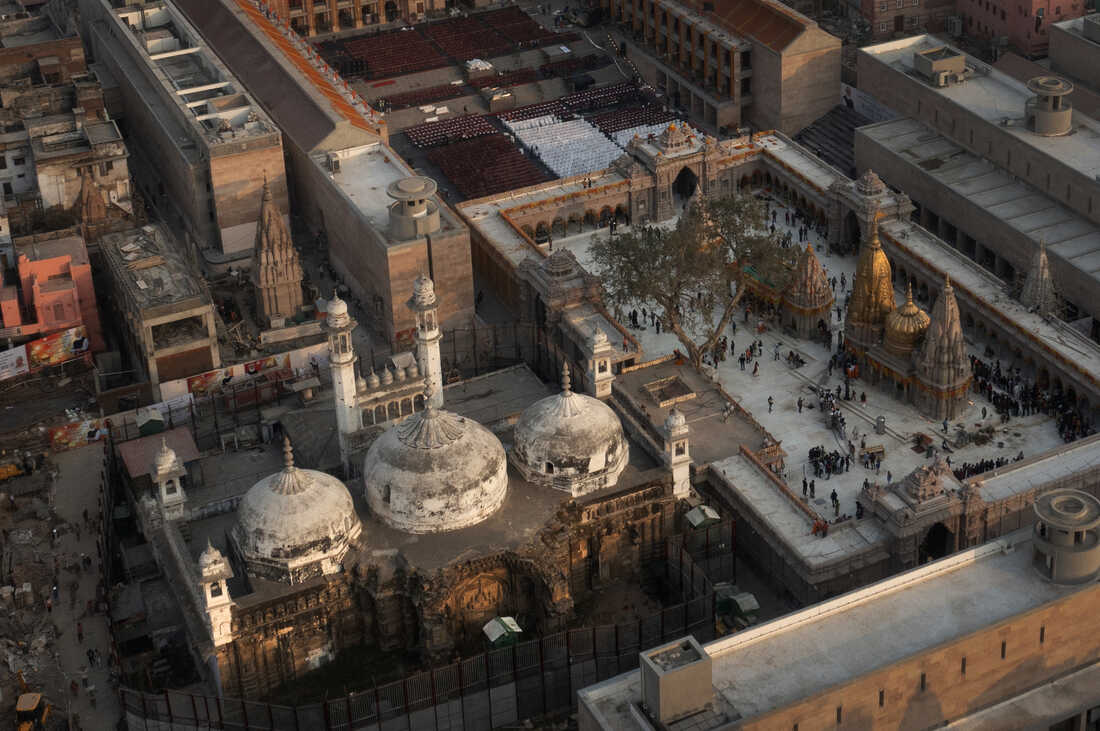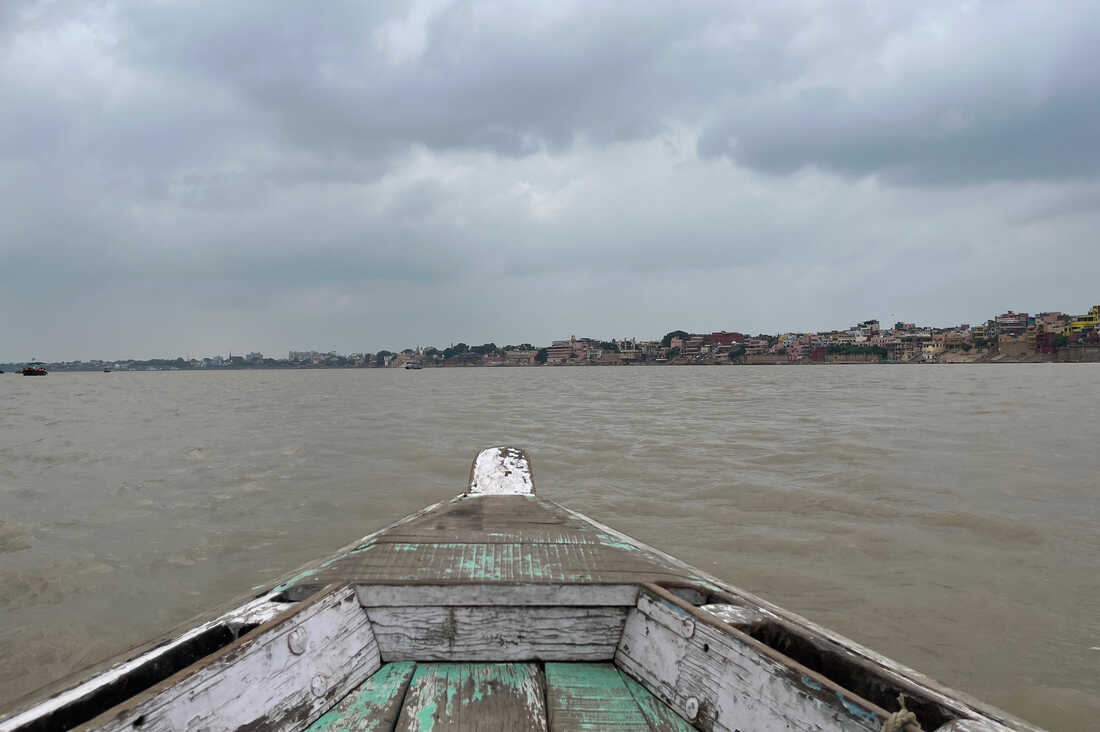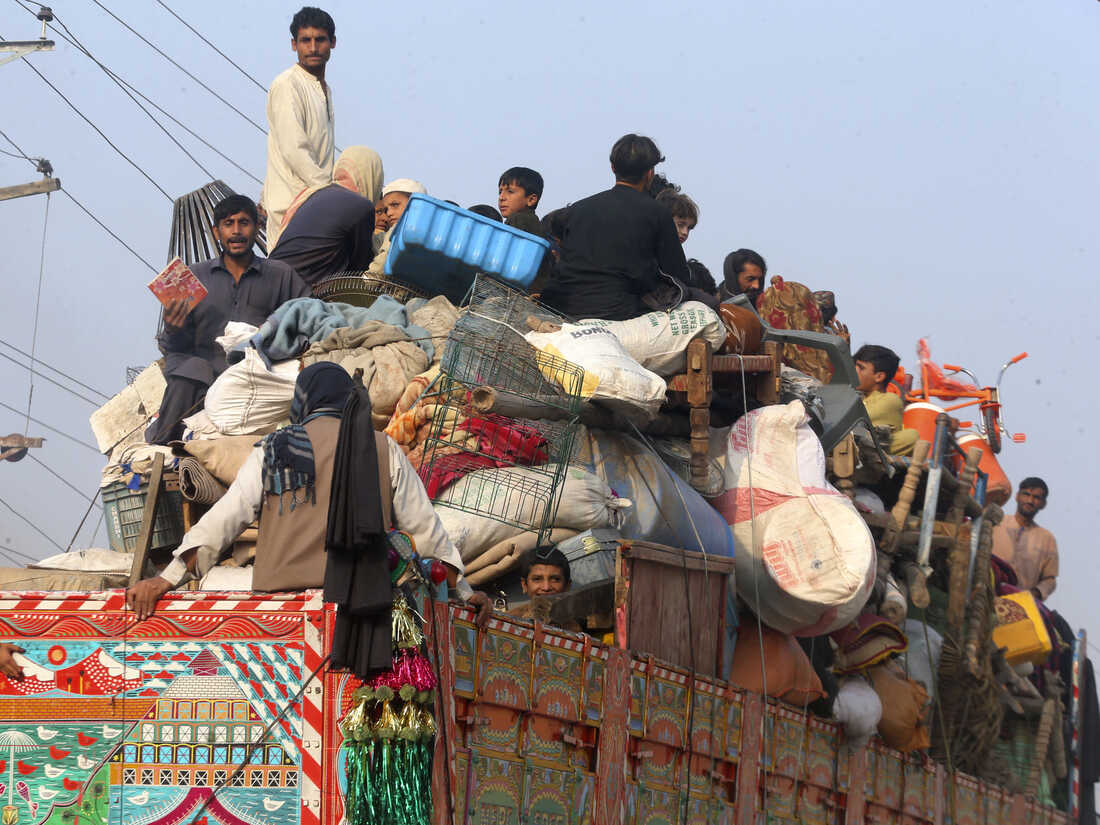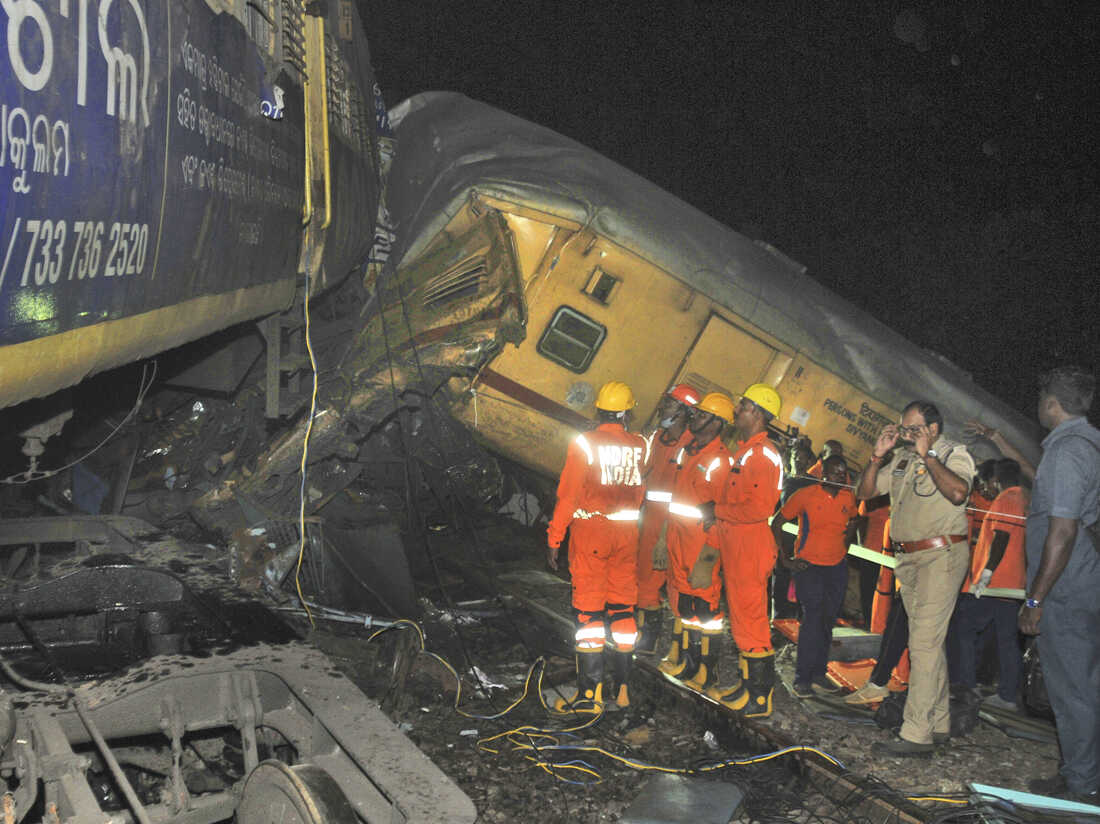A Hindu-Muslim dispute tests centuries of interfaith culture in India's Varanasi
By Sushmita Pathak
An aerial view shows Gyanvapi mosque (left) and Kashi Vishwanath temple on the banks of the Ganges River in Varanasi, India. Rajesh Kumar Singh/AP hide caption
toggle caption Rajesh Kumar Singh/APAn aerial view shows Gyanvapi mosque (left) and Kashi Vishwanath temple on the banks of the Ganges River in Varanasi, India.
Rajesh Kumar Singh/APVARANASI, India — On a recent Friday afternoon in this holy city in northern India, scooters, pedestrians and cycle rickshaws jostled for space on a street leading to the city's most famous Hindu shrine. As Hindu pilgrims dressed in saffron clothes made their way, Muslim men in skull caps walked alongside them. Both sets of devotees were headed to the same place.
The Kashi Vishwanath temple and the Gyanvapi mosque stand side by side in the heart of Varanasi. The mosque was built in the 17th century by Mughal ruler Aurangzeb after demolishing a Hindu temple. Years later, a Hindu queen rebuilt the temple beside the mosque. For centuries, both communities have shared the space, but now, some Hindus say they want to reclaim it.
In Varanasi, Muslim men in skull caps and Hindu pilgrims wearing saffron clothes make their way to a temple-mosque complex that's the subject of an ongoing dispute. Sushmita Pathak for NPR hide caption
toggle caption Sushmita Pathak for NPRIn Varanasi, Muslim men in skull caps and Hindu pilgrims wearing saffron clothes make their way to a temple-mosque complex that's the subject of an ongoing dispute.
Sushmita Pathak for NPRA religious dispute fueled by Hindu nationalism
For years, Abhinav Chaturvedi, a Hindu, has seen Muslim faithful make their way past his shop to pray at the Gyanvapi mosque. He remembers learning about its history as a child and approves of the legal action by Hindus to take the site. "What is ours must be returned to us," he says. "This should have happened much earlier."
the government of Prime Minister Narendra Modi has been pushing. Critics accuse Modi and his party of fueling religious disputes, particularly against Muslims and Christians, a charge that they deny. Sectarian violence breaks out sporadically in India. Clashes between Hindus and Muslims in the state of Haryana killed at least seven people in a week of violence .Varanasi is also the constituency of Modi and from where he has fought and won two national elections. In recent years, his government has undertaken major renovation of the Kashi Vishwanath temple, which includes building a wide corridor to connect the shrine to the banks of the Ganges River, which Hindus consider sacred. The government says it has done that to facilitate better access to the temple. But in doing so, "they've also exposed the mosque to greater view," says Michael Dodson, a historian of South Asia at Indiana University in Bloomington. This has made the mosque more vulnerable,.

The Ganges River flows through Varanasi, the cradle of Hinduism, and a city with a long history of interfaith harmony. But an ongoing religious dispute is testing its limits. Sushmita Pathak for NPR hide caption
toggle caption Sushmita Pathak for NPRThe Ganges River flows through Varanasi, the cradle of Hinduism, and a city with a long history of interfaith harmony. But an ongoing religious dispute is testing its limits.
Sushmita Pathak for NPRMany legal experts that the Gyanvapi lawsuit also goes against the spirit of the of 1991, which was passed "to prohibit conversion of any place of worship and to provide for the maintenance of the religious character of any place of worship as it existed" when India became independent in 1947.
While observers say religious polarization and attacks on minorities are increasing under Modi, tensions have existed since long before he came to power. His party, the Bharatiya Janata Party, played a key role in the rise of the Hindu nationalist movement in the 1980s and 1990s. At the time, the focus was on a different temple-mosque dispute. Many Hindus believed the 16th century Babri mosque in the northern Indian city of Ayodhya stood on the spot where the Hindu deity Ram was born. And in December 1992, shortly after an inflammatory speech in Ayodhya by a top BJP leader, a Hindu mob tore down the Babri mosque. The incident sparked deadly riots across the subcontinent. Many fear that the Gyanvapi case could be heading toward a similar fate. In 2019, India's Supreme Court ruled that the contested site in Ayodhya belonged to Hindus and a grand temple is being constructed there.
Hindu and Muslim livelihoods are intertwined in Varanasi — in handlooms of the city's famous silk sarees, weavers are mostly Muslim whereas wholesalers and customers are largely Hindu. Sushmita Pathak for NPR hide caption
toggle caption Sushmita Pathak for NPRHindu and Muslim livelihoods are intertwined in Varanasi — in handlooms of the city's famous silk sarees, weavers are mostly Muslim whereas wholesalers and customers are largely Hindu.
Sushmita Pathak for NPRHis son Ahmed Faisal laments that while everyone is focused on the religious issue, weavers in Varanasi are struggling to make ends meet. "I request Indian politicians to focus on ensuring employment and livelihood, instead of religious matters. Our interfaith culture is under attack but it will live on," he says. He recalls how his Hindu friends were at his side when his mother passed away a few weeks ago. Similarly, during the pandemic, he says Muslims helped carry the bodies of Hindus to the banks of the Ganges for cremation.
A narrow lane in northern India's Varanasi or Banaras, as it's also called. The city is the epicenter of Hinduism but is a mixture of different cultures and faiths. Sushmita Pathak for NPR hide caption
toggle caption Sushmita Pathak for NPRA narrow lane in northern India's Varanasi or Banaras, as it's also called. The city is the epicenter of Hinduism but is a mixture of different cultures and faiths.
Sushmita Pathak for NPRMishra says Varanasi residents are generally very adaptive and calm. "This has been raked up by political people, they are just exploiting the situation," he says, hoping that things remain calm in the future.
These days, police stand guard near the entrance to the temple and mosque, surrounded by barricades, as lawyers argue over the fate of the mosque in court. Mosque or temple, shopkeeper Surendra Kumar says it doesn't make a difference to ordinary people like him. Both are houses of God, he says, if only the public can accept that.



